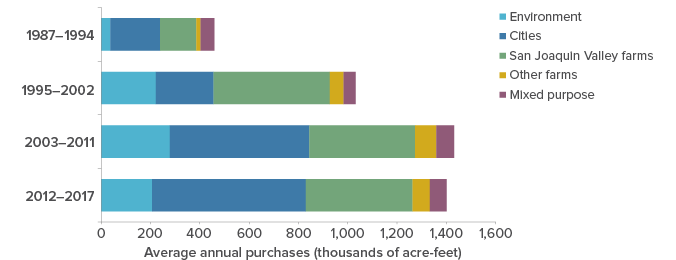Reform is needed to strengthen California’s water trading market and minimize the impacts of the Sustainable Groundwater Management Act, according to a new report by the Public Policy Institute of California.
Most water sales in California come from the farm sector and the major buyers tend to be cities in the San Joaquin Valley and Southern California, with the latter receiving 15 percent of their supplies from trades. Water sales have also benefited the environment, accounting for 17 percent of the total market flows over the last 35 years. The practice also contributed to keeping farming areas productive and orchards alive during the extreme drought.
Trading is also impacting land values in regions with overdrafted groundwater basins. With SGMA months away from implementation, sales of agricultural land are already correlating with surface water access in the San Joaquin Valley. Daniel Sumner, an agricultural economist at the University of California, Davis, has pointed out that water trading presents a unique opportunity for growers to supplement their income by fallowing acreage on poor farming land and banking groundwater, selling it for profit during dry years.

(chart courtesy PPIC)
But PPIC finds that the market has been mostly flat following large upticks in the 1980s and 1990s, while the regulatory process has grown complex. Most trading — up to 44 percent of sales — occurs in the same county or region. In presenting a report in February on the potential SGMA impacts to the San Joaquin Valley, Ellen Hanak, director of the PPIC Water Policy Center and lead author on both reports, said scaling up water trading within and across groundwater basin boundaries could reduce fallowing and economic impacts by as much as half.
According to the new report, the regulatory process for trading water is “fragmented and inconsistent” and varies by the type of water right, the restrictions from individual irrigation districts and the many groundwater sustainability plans currently being drafted.
The report emphasizes the need for a more centralized and accurate accounting of the water available for trading and to establish caps for sellers that would maintain environmental and legal protections. Another weak point is neglected infrastructure for water conveyance, which would be used for transporting the water trades.
PPIC has appealed to the legislature, state agencies and the governor’s office for a statewide effort to upgrade and streamline the water trading process.


